Operational Resilience at Alliance Bank: A Strategic Implementation Guide
Chapter 8
Conclusion – Building a Resilient Future for Alliance Bank Malaysia

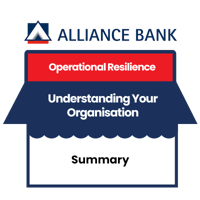 As we conclude this strategic implementation guide, it is evident that operational resilience is no longer a discretionary capability—it is a fundamental imperative for the continued stability, competitiveness, and regulatory alignment of Alliance Bank.
As we conclude this strategic implementation guide, it is evident that operational resilience is no longer a discretionary capability—it is a fundamental imperative for the continued stability, competitiveness, and regulatory alignment of Alliance Bank.
This guide has explored the critical building blocks required to establish a robust operational resilience framework tailored to Alliance Bank's unique attributes and strategic direction.
We began by understanding the bank's foundational structure and strategic purpose, recognising that any resilience effort must align with the institution's mission, operational context, and internal capabilities.
By examining Alliance Bank Malaysia's operating environment, we gained comparative insight into the broader financial services landscape, allowing us to contextualise risks and opportunities within a competitive and regulatory ecosystem.
A significant component of operational resilience lies in the people who drive it. The composition of Alliance Bank's operational resilience team is a vital enabler of success.
Cross-functional collaboration—drawing from risk management, compliance, IT, operations, and business continuity—is essential to designing and maintaining an agile and effective resilience strategy.
A culture of accountability, transparency, and preparedness must permeate every level of the Bank.
Further, identifying and safeguarding critical business services is central to maintaining trust, ensuring service continuity, and protecting the Bank’s reputation.
Through a thoughtful analysis of Alliance Bank’s key services and operations, we emphasised the need for impact tolerances, end-to-end process visibility, and effective response mechanisms in the face of disruption.
The Bank's distinct characteristics—its size, customer focus, digital orientation, and growth ambitions—necessitate a tailored approach to resilience.
Alliance Bank cannot adopt a one-size-fits-all model; its resilience strategy must align with its operational profile and the expectations of regulators, customers, and stakeholders.
Finally, we highlighted the organisational goals that should drive operational resilience forward at Alliance Bank Malaysia.
These include strengthening customer confidence, enhancing regulatory compliance, driving sustainable performance, and enabling rapid recovery from operational shocks.
These goals are not static—they must evolve with the threat landscape, technological advancements, and strategic shifts within the Bank.
Looking Ahead
Operational resilience is a journey, not a destination. The Bank's resilience posture must mature continuously as threats become more complex, from cyberattacks to climate events to systemic failures.
This requires regular testing, senior management engagement, robust scenario planning, and proactive learning from internal incidents and industry-wide disruptions.
Alliance Bank Malaysia stands at a pivotal point in its resilience journey.
With a clear understanding of its environment, a committed team, and a framework rooted in best practices and regulatory expectations, the Bank is well-positioned to lead in operational resilience within the Malaysian financial sector.
Let this guide serve not just as a strategic roadmap but as a call to action—embed resilience into Alliance Bank's DNA, ensuring it remains agile, dependable, and trusted in a world of constant change.
Operational Resilience at Alliance Bank: A Strategic Implementation Guide |
|||
| Understanding the Organisation: Alliance Bank | |||
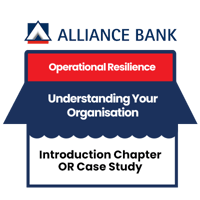 |
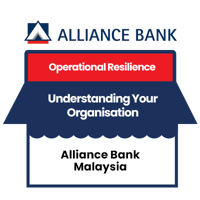 |
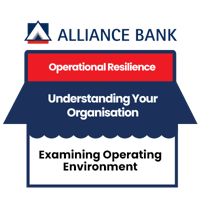 |
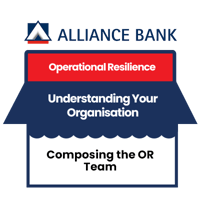 |
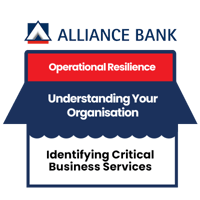 |
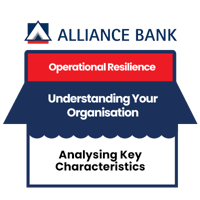 |
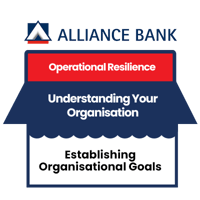 |
 |
More Information About Operational Resilience Courses
To learn more about the course and schedule, click the buttons below for the OR-300 Operational Resilience Implementer and OR-5000 Operational Resilience Expert Implementer courses.
 |
 |
 |
 |
 |
![[BL-OR] [3-4-5] View Schedule](https://no-cache.hubspot.com/cta/default/3893111/d0d733a1-16c0-4b68-a26d-adbfd4fc6069.png) |
![[BL-OR] [3] FAQ OR-300](https://no-cache.hubspot.com/cta/default/3893111/f20c71b4-f5e8-4aa5-8056-c374ca33a091.png) |
 |
|
 |
 |


 As we conclude this strategic implementation guide, it is evident that operational resilience is no longer a discretionary capability—it is a fundamental imperative for the continued stability, competitiveness, and regulatory alignment of Alliance Bank.
As we conclude this strategic implementation guide, it is evident that operational resilience is no longer a discretionary capability—it is a fundamental imperative for the continued stability, competitiveness, and regulatory alignment of Alliance Bank.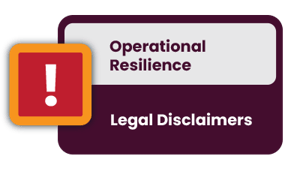






![Email to Sales Team [BCM Institute]](https://no-cache.hubspot.com/cta/default/3893111/3c53daeb-2836-4843-b0e0-645baee2ab9e.png)


